Wherever I am, my kids want to be. My city roots want to tell them to go play so Mommy can get some things done in the kitchen the quickest. But my home-centered homesteading heart knows they should be right next to me, learning the skills I was never afforded until I was 27! This is why I’ve learned to include my small children in the kitchen.
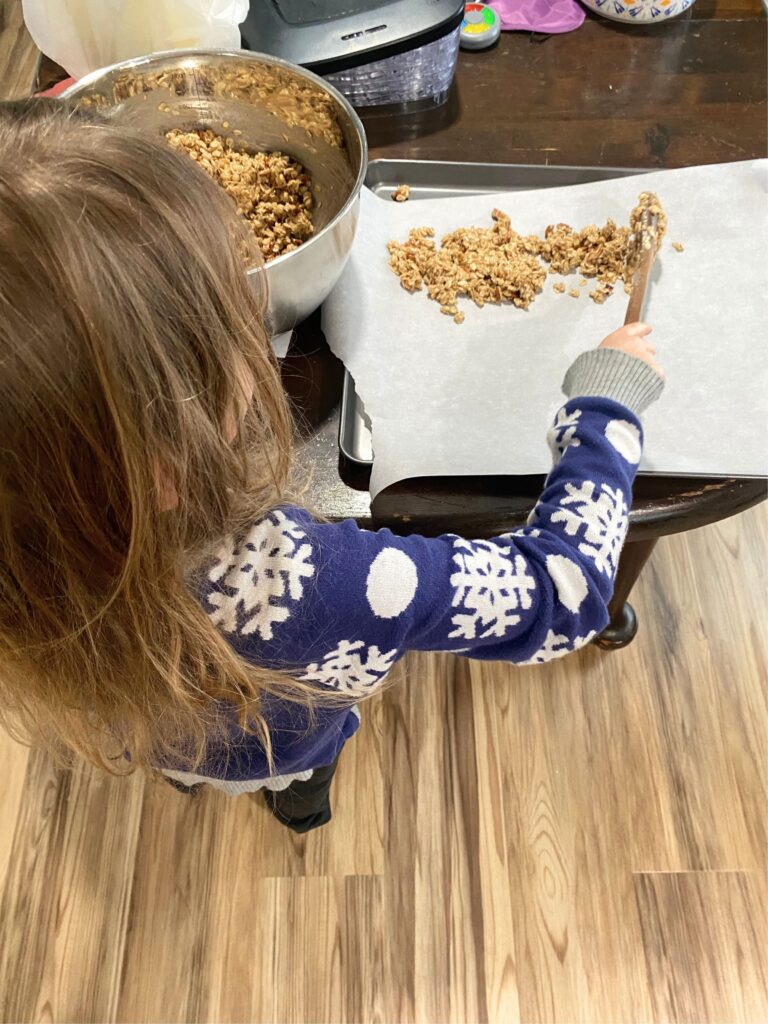
It is difficult at times to embrace the home-centered lifestyle I am so committed to. There are times when I don’t want to take the time to explain things or include my small children in tasks because I feel it is slowing me down. Each time this trigger button is pushed, I remind myself to surrender my current preferences and remember my long-term goals.
Our family vision is to build generational wealth. And no, my husband and I aren’t just focused on financial stability and independence, though that is part of the equation. We are building an entire skills portfolio for our children. This portfolio of wealth includes the homesteading skills we never had access to and the homemaking skills we were never taught.
In the last two years, our children have grown tremendously alongside my husband and me. We have built a chicken coop from scratch together, laid the flooring throughout our entire 3,000sq ft house together, learned to make and can different kinds of broth together, and cored, peeled, sliced bushels upon bushels of apples together. What a blessed opportunity we have been given!
Personal experience isn’t always the most credible source for implementing something yourself. I can understand the hesitation of including younger children in the kitchen. There are a lot of moving, potentially harmful parts! This article from Pathways.org does a great job of outlining specific ways kids of all ages can participate in simple tasks in the kitchen. Given my personal experience, however, I do think this article assumes younger kids are a little less capable than they actually are when they are encouraged to try new things often. However, when you are new to this way of thinking and aren’t sure where to start, the article is a great place to start.
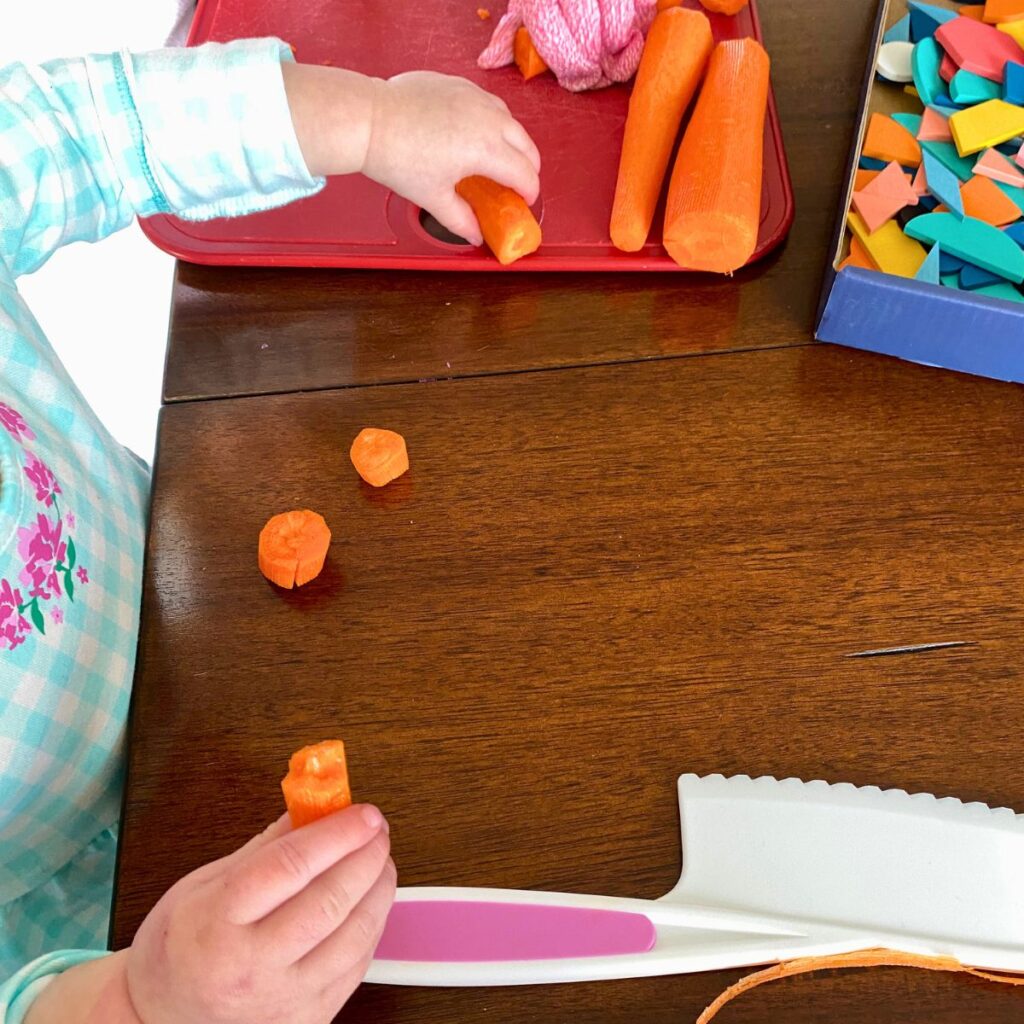
The largest learning curve for me has been cooking at home and especially cooking from scratch. Since moving to the homestead, I have tackled food preservation projects, learned how to properly use a knife (sort-of), and am gaining confidence in following from-scratch recipes. I’ve messed up a lot in canning and now I’m facing the issue of the majority of my glass jars bursting when stored in the freezer.
It is difficult to learn new skills. It takes a lot of mental focus and energy that is darn near impossible to have with young kids running around. Therefore, I do have boundaries in place and there are times that I don’t include my kids in the kitchen because I am not confident in my bandwidth to meet their needs and have a great time doing it. Generally this is when I am tackling a new-to-me recipe or skill.
Honestly, I still could do better at including my kids in learning alongside me with new recipes or cooking techniques. Over the last two years, however, I have gotten more proficient at inviting my children into the kitchen with me. This did take me ensuring I had the right expectations for the task at hand. I have to remember the most important thing is that my children are learning a new skill in a safe place, not that everything is done to perfection. These are the ten things I have learned since doing so.
10 benefits of including kids in the kitchen
- Honing fine motor skills
- Understanding the importance of kitchen safety rules & food safety
- Creating healthy eating habits & learning the benefits of cooking at home
- Additional quality time & establishing family traditions
- Gaining a sense of accomplishment
- Cooking sparks creativity
- Learning essential life skills
- Appreciating of financial investment & budgeting for healthy foods
- Developing math and language skills
- Exploring new foods and new recipes & expanding the palate
Honing fine motor skills
Now, being honest, I had to look up the differences between hand-eye coordination and eye-hand coordination as I had never heard the latter before. However, the more I read, the more it makes sense to use eye-hand coordination. You see, we first use our eyes for input and then there is a response from the hand, not the other way around. It is actually quite interesting if you’re interested in a child’s development and I recommend reading this article for more information.
Dexterity is how proficient we are in performing tasks. It is a skill that must be exercised to form and stay strong. Not sure I like the way I’m wording this but want to provide this info somehow! It is absolutely imperative for our children to develop these skills and what better way than to have a well-rounded learning opportunity with being in the kitchen with Mom. Home is the ideal place to explore, develop, and grow after all!
Kitchen safety & food safety
My children are also afforded the opportunity to learn about kitchen and food safety when they are with me in the kitchen. No, this isn’t a simple “Don’t touch that stove! It’s hot!” kind of command. Many conversations have organically unfolded about how to properly handle raw meat, the risk of foodborne illness, and why different vegetables are cut in different ways. While filling canning jars with different goodies, we’ve discussed what the pressure canning process is for and how it is truly a science with specific methods.
Now, do my young children understand all of what I’m teaching during the cooking process? No, probably not. But my young kids will grow into older kids with a solid understanding of food preparation and preservation because I have committed to equipping them with essential life skills.
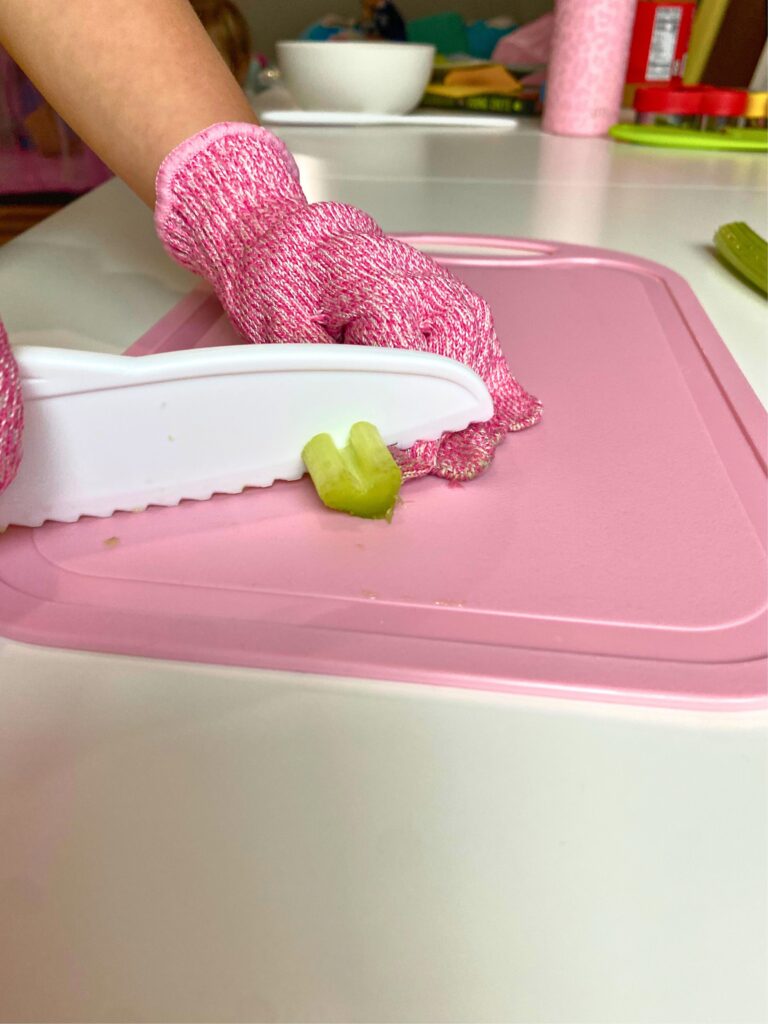
How do I balance this with children that each have a different skill level?
While we are preparing apples for canning or processing meat chickens, our kids are right beside us. We require them to watch once or twice and then they are allowed to try certain steps themselves that are age-appropriate.
An example of this is when we are preserving apples. Both my five year old and three year old were allowed to help this year with using the Johnny Apple Peeler Slicer Corer. I found a cheap Pampered Chef one unopened at a garage sale last year so now we have two, one for each of our oldest daughters.
Each child is allowed to use one while I am prepping the light simple syrup for canned apple slices, cutting and dicing for apple pie filling, and throwing the others in a big crockpot for applesauce and apple butter. It really helps to lighten my load, though the supervision does look different.
For the oldest, she is allowed to remove and replace the apples as long as she is putting them on squarely. If there are more than two apples that she does not put on properly, then Mom takes over. I also remove any apples whose cores break. My three year old is not yet capable of putting on or taking off the apples so she lets me know when she is in need of assistance. Otherwise, it’s a pretty hands-off process for me while I focus on the other tasks at hand. This Fall 2023 season was our second time preserving apples and we did four bushels’ worth in about two weeks!
Though every situation is different and the children don’t always gracefully accept their limits, we have really enjoyed working together as a family to preserve food for our future enjoyment. We recently opened up our canned apple slices for the first time and helped ourselves to two quarts’ worth. They were delicious! How satisfying it is to prepare or create something with your own two hands.
Healthy eating habits & the benefits of cooking at home
Growing up, I didn’t necessarily have a healthy or positive attitude toward food. I was taught to focus on the caloric value or how it tastes rather than the ingredients going into the food or the processes to make it.
Since my foundation with food was an unhealthy one, I certainly knew nothing about cooking at home or meal prepping before getting married. I have even come a long way just in the last two years on the homestead. Now, it is not my stomach that dictates what we are eating that day but what we have on hand and the time constraints. I have to be more intentional with our meal planning because cooking at home and particularly from scratch takes more thought than convenience items.
My children see this as I am constantly narrating my thoughts as I work through the meal plan for the week or when I have to pivot when things don’t go according to plan. We also frequently discuss the differences in ingredients when grocery shopping or when they ask why things taste differently (better) at home than store-bought.
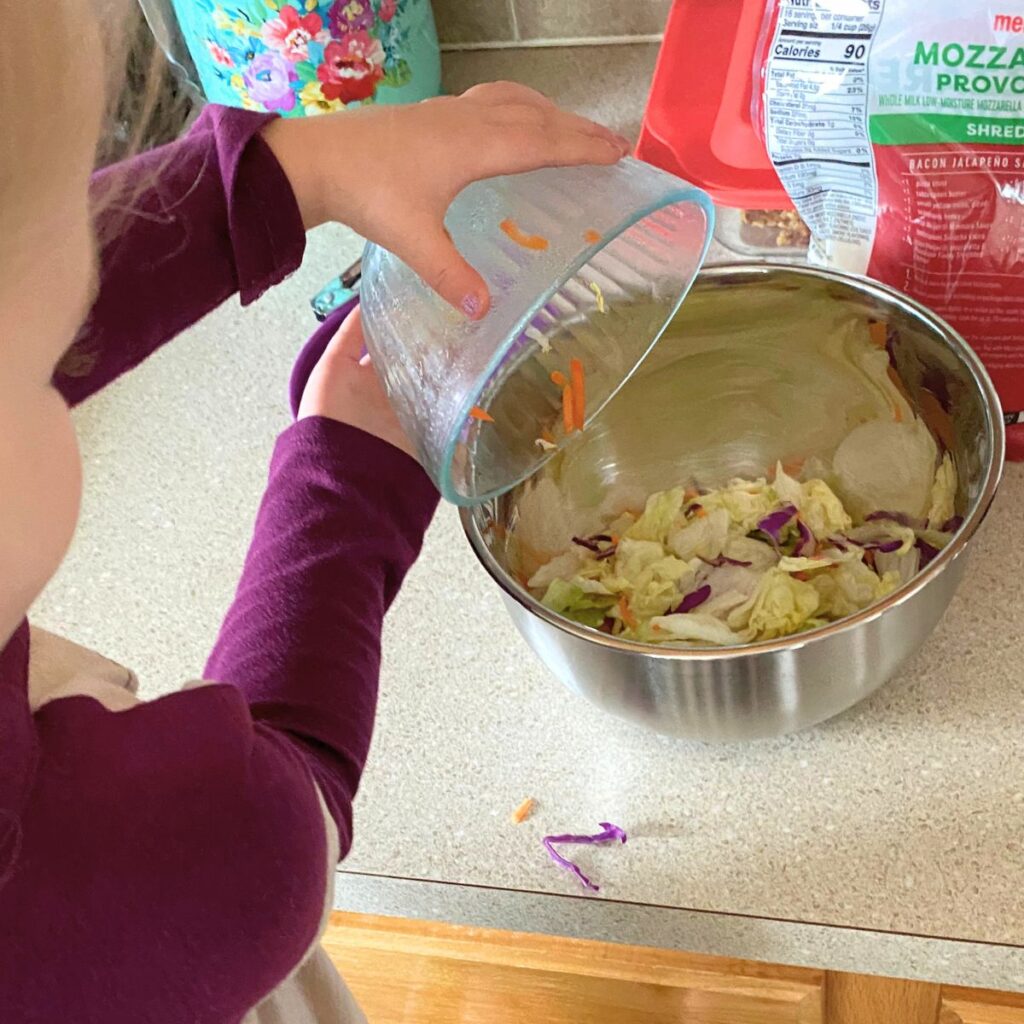
What led us to being more conscious of what was going into our bodies
We do not eat holistically or 100% organic by any stretch of the imagination. I still have a long way to go in my cooking abilities and routine to accomplish that. Once we have a garden I believe it will become easier, but right now we are focused on adjusting our palate to foods that are in-season and purchasing the highest quality when possible. Though one could assume this came from our desire to live a more simple, healthy homesteading lifestyle, we actually came to this conclusion in an entirely different way.
Two months after moving into our home, our second daughter began experiencing severe health issues. After ER visit after ER visit and even an overnight stay, we knew we had to get serious about changing what we could control. This led to an overhaul in our home concerning renovations, household products, and what we had in the pantry. I started sourcing local dairy, meat, and produce and started the food preservation journey. We now are more aware of what ingredients are in our food. Although we aren’t perfect in following a strict diet, we do have a greater balance of natural and processed favoring the natural and organic.
I am so thankful to say we have not had a medical emergency in over a year. Our daughter can finally run and play like other children and is not debilitated by her health conditions. Though we do believe our lifestyle changes have contributed to that, it is only by the grace of God our little girl is healthy and whole and well.
We want to continue on this simple, healthy living journey for the benefit of the whole family’s health. And a lot of that starts in our family kitchen.
Enjoying more quality time & establishing family traditions
Someone I really look up to in the homesteading/cooking from scratch world is Becky from Acre Homestead (found on YouTube). She is so informative and creative in the kitchen and is passionate about providing the best meals for her family. You can tell she truly loves serving her family in that way and every time I watch her videos I am encouraged.
One of the things I enjoy most is when her and her mother are in the kitchen together. This link will take you to one of their most recent cooking days for Christmas. The way they operate around each other and work together to create elaborate and delicious meals is awe-inspiring for a mom of three girls like me.

I desire for my children and I to have things to bond over like cooking at home and homesteading and whatever else we are interested in that will last beyond the years they are in our home. I pray the more I include them in the things that bring me joy, the more they will want to bring me along in the things that bring them joy in the future.
Creating something with your hands ushers in a sense of accomplishment
When we are satisfied with the finished product, there is a sense of accomplishment. When someone compliments what you have created and brought to the table—WOW! There’s nothing like the look in our daughters’ eyes when their daddy told them our new cookie dough recipe was the best he’s ever tasted.
Knowing that you’ve created something with your own hands and executed it well magnifies your confidence to tackle the next unknown. I believe it is our job as parents to foster that as often as possible to raise healthy, stable people who will go out and positively impact their world.
Cooking with new ingredients or trying new recipes sparks creativity
Cooking, unlike baking and canning, isn’t exactly a science. We do have specific guidelines we must follow, like what temperatures and times to cook certain foods and what flavors generally compliment one another. There is also a lot of freedom in cooking and that is where creativity can flourish.

My six year old told me the other day she loves to help Mommy in the kitchen because of all of the samples! And this is true. We are constantly tasting and retesting as we adjust ingredients to our tastes to make healthy meals the entire family will enjoy. If we do not have a certain ingredient, then we must find creative solutions to still plate a delicious dish.
A greater understanding and development of essential life skills
When we are at the grocery store, I allow my children to pick out the produce they can reach or put into the cart what they cannot. We discuss what makes a good banana or why I avoided a certain head of broccoli. When we are preparing the fruits and vegetables and there is a bad spot, I explain what has happened. If it is salvageable but unsavory for me to eat, I will put it in the chicken scraps bowl. If it is absolutely inedible, it goes in the compost bin or trash can if I’m super lazy.
The entire time I can narrate what critical thinking skills and analysis I’m using and explain the why. It does take more time for me to do this, but from a young age I want my children to be equipped. This is one of the great ways I can equip them for their future and hopefully make some fond memories while we’re at it.

We also talk about how Mommy has sourced different food items and what part of a dish has been homemade and what was not. We discuss the reasonings behind this and how we could make the dish entirely from-scratch next time. It is a learning opportunity for our whole family. We can also impart wisdom to our girls on how to provide for oneself in basic but necessary ways. While convenience is nice, there is always a sacrifice somewhere. We must weigh the benefits against the cost and we enjoy teaching our girls these skills early.
Equipped financially to make solid, wise choices
When cooking from home often, there is a certain investment that most people want to make. Whether it is a good set of kitchen knives, a dutch oven, or a KitchenAid mixer for baking and bread-making needs, there is a cost that should be discussed.
There are also a lot of gimmicks out there for the types of food we buy and it is best when we are equipped with knowledge to not be tricked by those things. Anyone can slap a label on something (generally) and charge more for it. So how do we combat that naivety? By involving our children in our budgeting and in our financial decisions and the critical thinking skills that go into those decisions. This does not mean they are partners or need to participate in every discussion, but it is healthy for them to see how to tackle different financial situations and how that plays a part in the overall health of the family.
While it may not seem like an obvious consideration, finances and making wise food choices do have a role with one another. Nothing is as segregated as the human mind likes to compartmentalize at times. There are consequences to every action and we desire for our children to grow up knowing that in a variety of situations to be better equipped when they are making those decisions for themselves and their families.
Developing math & language skills
Even a simple recipe will incorporate the valuable life skills of math and communication. It can be as simple as how many eggs are needed to make the cake or as complicated as doubling and tripling ingredients for larger batch cooking.
If you are working toward a homeschool education, then cooking is the perfect way to develop math and language skills. Through reading a recipe’s ingredients and potentially adjusting ratios, math skills are enhanced. As you walk through cooking meals together in the family kitchen and communicate what comes next, your child has the perfect opportunity to gain good practice of these skills through hands-on activities.

This is not just beneficial to homeschoolers, either. Every person uses math on a daily basis, though it isn’t always applied in the same way as taught in school. Therefore, we need exposure to using the critical foundation in a variety of scenarios. Cooking in the kitchen and following a recipe is a great way to experience that.
Exploration of what is “new” & positive mindset
It is really common for us as people to look at what is new or different and immediately have an unfavorable reaction to it. We are creatures of habit and that caution is partially to keep us safe. Unfortunately, we have to be taught how to explore safely and not many in today’s world are afforded that teaching. Immediately we categorize anything as new or different as “wrong” and “should be avoided.” This can manifest itself in many ways, but one of the more simple ways is through picky eating.
Exploring new foods and recipes affords picky eaters the opportunity to learn more about the food they are eating and combat some of their hesitation. I have found that my children are more likely to eat new foods or foods they say they don’t like when they have a hand in preparing it.
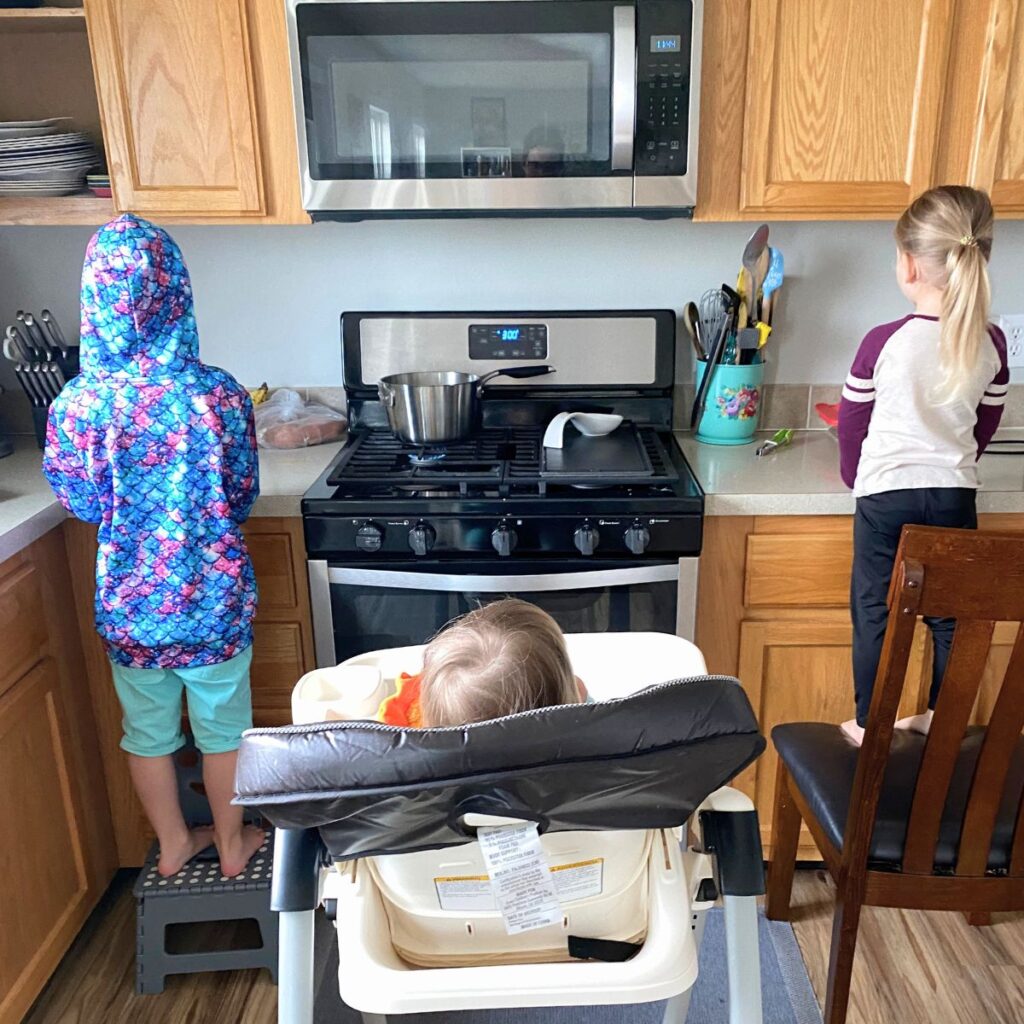
Tools you may need to include your small kids in the kitchen
A step stool, kitchen chair, high chair or even a kids kitchen step stool
If you want more ideas on products that would benefit you and your children in the kitchen, head on over to my post “Gift Your Little Chef the Best Kids Kitchen Tools For Winter.” There I detail the five kitchen products we use whenever the whole family is involved in the food preparation.
Applying the benefits
There are so many benefits to including your children in the kitchen and also many reasons why you would want to. Whether it’s for the memories, the equipment of valuable life skills, to develop their physical capabilities, or to simply try something new, there is a reason and a benefit for everyone. Not only will your children learn and grow, but you will too. What a blessing that is!
Tag me on Instagram @cityfolkhomestead how you and your children work together in the kitchen!

More ways to include your children in daily tasks
Low-Effort Tips for Homemaking with Young Kids
Free Kids Winter Activities List with 54 unique activities!

75 years ago the skills I learned on the farm and in the kitchen were not by choice, but necessity. However, I have always been grateful for the knowledge, and the ability to figure most things out by myself using critical thinking.